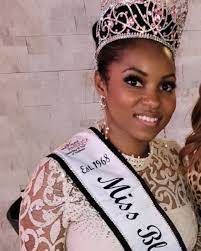
By Stacy M. Brown, NNPA Newswire Senior National Correspondent
The Miss Black America Pageant is coming back to Atlantic City to celebrate its 55th anniversary. It will be held on the Boardwalk on Saturday, December 16th. The return to the city where the “Historic Protest Pageant of 1968” took place has generated considerable anticipation among many. As announced, a captivating parade and a series of exciting festivities are guaranteed as the prelude to the grand main event at the renowned Showboat Atlantic Hotel.
J. Morris Anderson, an individual who performed at the forefront of his time, established the Miss Black America Pageant, and made a lasting impact as the founder of the “American Institute of Positivity.” “The Seeds of Positivity,” the term “Positivity,” and the “Success Seekers Seminars” hosted by the institute are all works Anderson authored. His influence transcends the pageant, as does his vision, which surpasses the conventional.
Aleta Anderson, Morris’s daughter, stated that it’s critical to recognize the differences between the Miss Black America Pageant and a Black Miss America pageant. “I’ve been working with this pageant since I was a little girl,” Anderson declared. “The thing that it originally was meant is still there, and it means so much more in that it provides an opportunity for the young women to participate.”
Established in 1968, the organization carved its path, boasting a syndicated television network to showcase Black women’s often-overlooked beauty, talent, and intelligence in mainstream pageants. “Miss Black America was always a pageant of access,” Anderson told the Black Press. “It wasn’t a beauty pageant, but a story of Black beauty, and of confidence, and self-esteem. And it continues to be a part of our learning process as we now have all these platforms of exposure.”
Saundra Williams, a college student from Philadelphia, made history as the first Miss Black America. She used her platform to showcase an enchanting traditional African dance and to challenge the long-standing exclusion of Black women from the Miss America pageant. “Miss America does not represent us because there has never been a black girl in the pageant,” Williams once stated. In 1970, Cheryl Browne became the first black Miss America contestant, and Vanessa Williams secured the historic title in 1983.
Over 50 distinguished women will compete for the Miss Black America title this year, joining the ranks of past champions such as Oprah Winfrey, Toni Braxton, Bern Nadette Stanis, and Nicole Hibbert. Anderson underscored the pageant’s lasting relevance as a symbol of hope for young women. The pageant was originally created to celebrate Black beauty, confidence, and self-esteem. Now it has become a platform for challenging traditional ideas of beauty and providing needed exposure.
Anderson emphasized the pageant’s diversity, which transcended social, economic, and educational limitations. She described the Miss Black America Pageant as a national and global event that has shaped American history since 1968.
“We have so many young women in the pageant and just because it’s the Miss Black America pageant doesn’t mean it isn’t diverse,” Anderson argued. “The diversity exceeds socio-economic status, and our education because the way we are educated is different. Every woman who has participated is vested and becomes a lifelong participant and we have so many coming back to Atlantic City to pay homage.”
The first-ever senior Miss Black America will be crowned, Anderson believes, marking a historic event that will give the competition a new dimension. She promised to commemorate J. Morris Anderson’s devotion to Black women by keeping the pageant going forward as a legacy program.
“I want everyone to walk away with the feeling that anything is possible and that they have the support and a window of opportunity,” Anderson stated. “It doesn’t start in Atlantic City, it starts before. Getting there and showing up, being highly motivated, and having a feeling of going into this that they are now a part of something that provides an experience that elevates the rest of their lives.”

